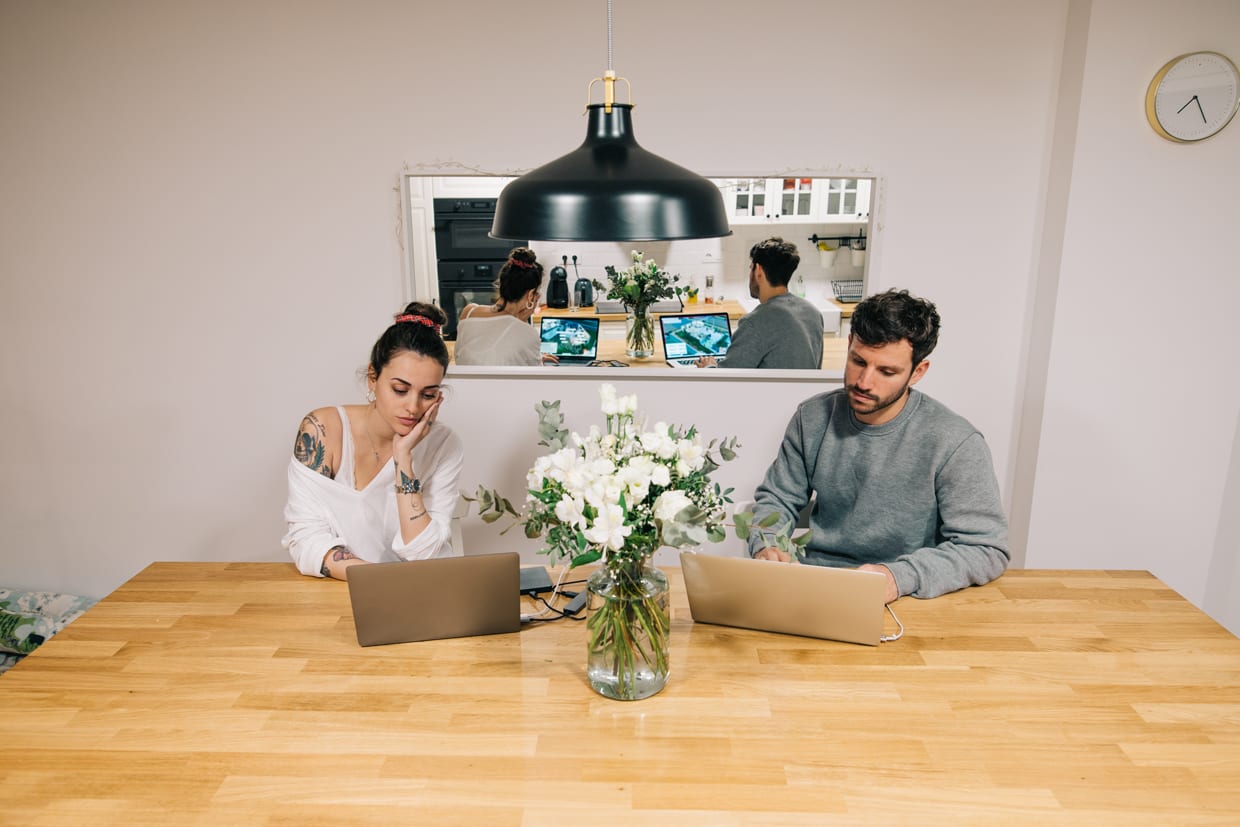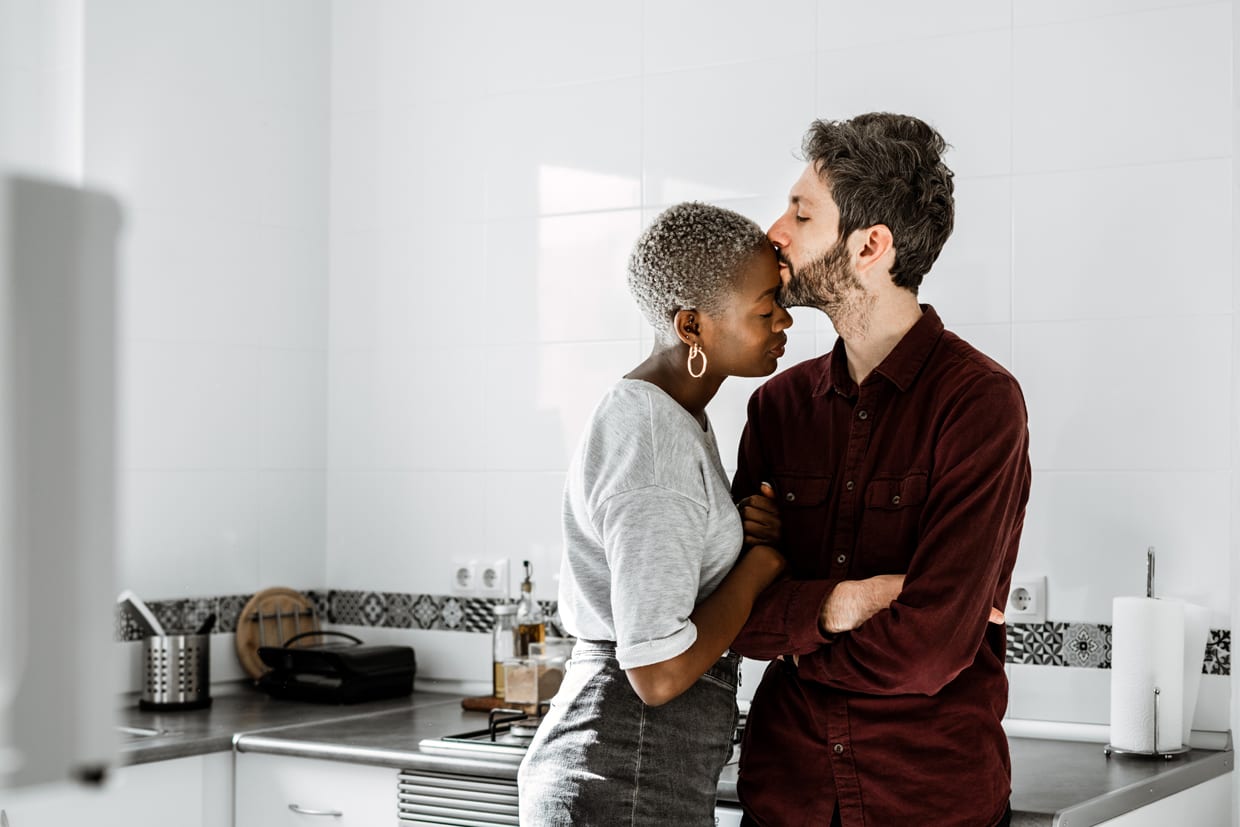Being in a relationship is hard work. Now add the stress of a global pandemic and you have a host of new problems on your hand. Your partner’s loud chewing, for example, or the way they pace around the apartment when on a conference call. While some people are trapped in a small space together, other couples are being forced apart, trying their hands at long distance for the first time in their lives. The level of your communication may struggle a lot. 24/7 together for some can be a dream and for others can end up with low libido and divorce.
Studies show that on average 30% of people are experiencing mental health issues, depressive symptoms and forms of PTSD as a result of quarantine. Times are tough and our relationships can fall through the cracks if we are not intentional with how we spend our time together.
Shari Foos, a Licensed Marriage and Family Therapist, adjunct professor and scholar of Narrative Medicine, recommends “Relational Mindfulness.” It is a therapy experience that involves taking turns with active listening (without judgment), agreeing to envision the other person’s perspective and finding ways to appreciate their position and reconnect in a totally disconnected world. We spoke to Foos to get the lowdown on how to listen properly, what daily steps to take and how to break up virtually if things do not turn around.
An average 30% of people are experiencing mental health issues, depressive symptoms and forms of PTSD as a result of quarantine.
Q: What are some of the issues you have seen arise in couples during this time?
Shari Foos: Well, in a lot of cases, it’s just being with each other. I would recommend finding ways to be separate, even if you are in a small space.
When you come together to talk, it helps to have a date for a specific time with a limit, where you’re both going to put yourselves aside and get into a relational mindfulness frame of mind to listen to what’s going on with the other. You may have certain issues that you want to talk about, or it may just be a free flow. You want to create a habit of deliberately being there for the other person with respect rather than only having random conversations that wander.
You can also try:
- Journaling or Write letters to each other: Deepen your connection with yourself and express appreciation to those you love.
- The Seesaw Effect: Only allow one partner to be down at a time. This way the other is required to lift them up.
- Dream Capture: Plan together 3 types of projects and dreams you have had on your back burner.
- Inspired Ideas: Out of reach aspirational goals that require looking forward. Start the research process.
Q: In your new book you mention ‘relational mindfulness.’ What does that mean for people?
SF: It means that when you’re talking with someone that you aren’t just there as a blob, but you’re there in a real two-way street. When you’re telling me about your feelings or your story, I put myself aside so that I can absorb what you’re saying from your perspective. If you put yourself in your judgment and the experiences that you would typically rely upon to understand someone else’s story, you’re probably going to be limited or judgmental. Relational mindfulness is really about taking turns, being respectful, open-minded, non-judgmental and loving.
Q: What are the rules for active listening?
- Formalize your commitment to start this as a different conversation.
- Select a neutral area and atmosphere in your home.
- Promise mutual respect and confidentiality.
- Speak to be understood. Listen to understand.
- When it doesn’t feel like a good time, mutually agree to postpone.
Q: What is something my partner and I can do to avoid holding grudges or getting into regular arguments?
SF: I would recommend creating a relationship calendar. It is a calendar that you and your partner create together, where you schedule check-ins for your relationship.

Every month you schedule emotional, family and household goals and practice telling the truth about subjects that are often scary to bring up. Every week you set aside 60 minutes to clear up anything emotionally outstanding from the week. The point of this is to make sure that nothing festers inside of you and it gives you a time to address what you need or want in relation to a specific issue. Daily, you set aside 15 minutes twice a day to disengage from everything and connect with your partner on a more meaningful level. This allows you to put out any immediate fires, show and share appreciation and gratitude, and to do an honest self-check on your behavior, actions and attitude.
Q: What is something else is important to know when you quarantine together?
SF: That it’s your responsibility to create your life, not the other person’s responsibility. No matter how much you come together or do things together, even if you work together, you’re still separate people. Once you lose sight of your personal mission or dreams or the kinds of things you need for your own life, because everything has been merged, you’re going to start losing parts of yourself. Not that you can’t get it back but you’re not going to feel whole. So, it’s important to remember that you’re two individuals who come together in many meaningful ways but not every way.

Q: What is the best way to digitally break up?
SF: Over video chat, even though you don’t ever have that exact feeling of eye contact. That said, you do look really closely at one another, similar to the way would look at an actor in a movie. I think it should just come from your heart. I mean, if it’s because you don’t respect the person anymore, it’s going to be a little tap dance, but if you love the person, you’re not intending to hurt them. It’s just not going to be right for you in the long run. Always come from an I statement. Don’t say “it’s because you’re such a difficult person”. But if you come from an I statement and they’re insulted, then they’re insulted. You’re not doing something disrespectful.
Q: Is not wanting to do long-distance with your partner a good reason to break up?
SF: Well, here’s what’s so interesting. Would you break up with a friend if you weren’t able to see them for a while? What you’re saying is relationship is not worth the unknown. All relationships that are long going through those periods of “I really don’t like you”. Everyone going into marriage needs to know that there will be things that you cannot stand about the other person. You don’t have to love everything about them, you just have to tolerate certain things and be respectful.







